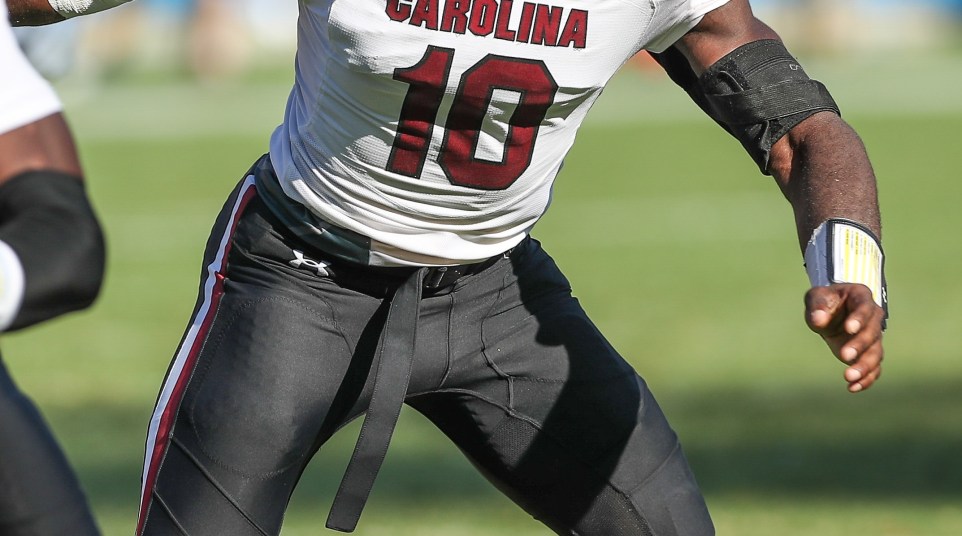
Blind inclusions, glaring omissions highlight voting for AP's All-SEC Team
The Associated Press released its choices for first- and second-team All-SEC on Monday. As usual, I had a few gripes with the list.
Keep in mind that there were only 13 voters involved in the process, so that’s not much of a sample size. For what it’s worth, the AP has 61 voters taking part in its weekly Top 25. Why so few are included with the All-SEC teams is a mystery.
Additionally, most of the voters are beat writers who cover a single program in the conference on a day-to-day basis. While they certainly know their own clubs inside and out — they’re always the best sources for boots-on-the-ground info — they don’t necessarily have intimate knowledge of the 13 other schools in the league.
RELATED: Reviewing preseason picks for SEC West
For example, an Alabama beat writer might not see much of Kentucky since the Crimson Tide and Wildcats didn’t play each other this season.
More often than not, voters do a fine job making picks on the offensive side of the football at the skill positions. Quarterbacks, running backs, wide receivers and tight ends have recognizable statistics accumulated over the course of the year.
However, along the offensive and defensive lines, voting tends to be very erratic. Too often voters lean on team success and name recognition — if you were voted preseason All-SEC back in July, your odds of making the team after the year skyrocket — plus there aren’t always digestable stats to separate great players from the merely good.
Alabama’s Cam Robinson won the Outland Trophy in 2016. Many experts told me that he wasn’t even the top O-lineman in Tuscaloosa.
The first-team offensive line for the AP includes tackles Isaiah Wynn of Georgia and Jonah Williams of Alabama, guards Ross Pierschbacher of Alabama and Braden Smith of Auburn and centers Bradley Bozeman of Alabama and Will Clapp of LSU.
That’s three first-teamers for the Crimson Tide. Injuries down the stretch were a big factor, but considering how poorly ‘Bama ran the ball the last time out against Auburn — Williams is a no-brainer, for sure — Pierschbacher in particular didn’t play like All-SEC. Tennessee’s Trey Smith or Missouri’s Tre’Vour Sims might have been better choices.
At center, Lamont Gaillard of Georgia was every bit as effective as Bozeman, if not better. So was Frank Ragnow of Arkansas until he got injured.
Along with Smith and Ragnow, the AP’s second-team selections for the O-line are Florida’s Martez Ivey, Ole Miss’s Greg Little and Mississippi State’s Martinas Rankin. All three are expected to have lengthy careers in the NFL.
Ivey (below) was an All-SEC honoree last year at guard, while this year he’s a second-teamer at tackle. After watching the Gators play, it’s hard to believe anybody on that offense was deserving of such accolades. He was decent at tackle and has tons of upside, but he was more of a legit difference maker previously at guard.

Credit: Kim Klement-USA TODAY Sports
A case can be made that Little and Rankin shouldn’t be there, either. Andrew Thomas of Georgia and Zach Bailey of South Carolina were favorites among film buffs.
“I actually thought Rankin had a pretty good year,” said SEC Network analyst Cole Cubelic, who is a former offensive lineman at Auburn. “Ivey is super talented, just inconsistent. But he was dominant at times. Bozeman was solid. He faced the toughest competition over him week in week out. There were just a lot of quality centers in the SEC this fall. I look to award consistency and effort, not always ability.”
Another name to consider is Auburn’s Austin Golson. The most versatile blocker in the league this year played center, guard and tackle for the Tigers. Depending on who was healthy around him on The Plains, he sometimes switched spots from series to series.
As for the defensive line, the AP’s four choices were Jeff Holland of Auburn, Da’Ron Payne of Alabama and Jeffery Simmons and Montez Sweat of Mississippi State — Holland was also voted SEC Defensive Player of the Year. He was second in the conference with 9.0 sacks and tied for sixth with 12.0 tackles for loss.
Simmons and Sweat were also easy selections. Between them, they had 14.0 sacks and 23.5 TFLs. What a duo they were for the Bulldogs.
Payne, on the other hand, is yet to live up to his 5-star status once upon a time on the recruiting trail. While he recorded 45 tackles, which is productive for an interior defender, he had but 1.0 sack and no other plays behind the line of scrimmage.
Meanwhile, Florida’s Taven Bryan was only a second-team pick. He was credited with 4.0 sacks and 6.0 tackles for loss among his 40 stops. But even beyond the numbers, rarely did Payne totally jump off the screen when I watched the Crimson Tide play this season — I saw every snap, too. Bryan repeatedly took over games for the Gators.
Somehow, LSU’s Arden Key was First-Team All-SEC at linebacker, which is ridiculous. The league’s most talented pass rusher had 4.0 sacks in eight games.
RELATED: Reviewing preseason picks for SEC East
Had he been 100-percent healthy, Key could’ve put up 15.0 sacks and 25.0 tackles for loss. He wasn’t, though. His offseason shoulder surgery and absence from Baton Rouge for the entirety of spring practice was evident at times.
Skai Moore of South Carolina was a second-teamer, which validates his return to the Gamecocks after missing all of last year with a neck injury. That being said, he should’ve received more votes than Key — they’re different kinds of players, no question about it, but they’re both listed at linebacker. Moore liberally filled up so many box scores.
Most voters never played offensive or defensive line, but Cubelic did. There’s no shame in asking experts like him for their thoughts before filling out a ballot.
